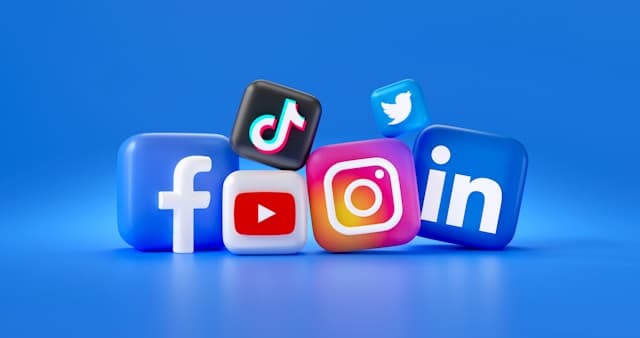
Harnessing the Power of Hashtags for Social Media Marketing

Introduction to the Power of Hashtags
Hashtags have transformed from simple symbols to powerful tools in social media marketing. Their evolution over the years has significantly impacted how content is discovered and shared across platforms. Today, leveraging hashtags effectively can greatly enhance the reach and engagement of social media posts, making them a crucial component of any marketing strategy.
The Evolution and Importance of Hashtags
The hashtag, once just a pound symbol (#), has become a significant part of digital communication. Its introduction by Twitter in 2007 revolutionized how information is categorized and discovered on social media. Hashtags allow users to tag their content with relevant keywords, making it easily searchable by others interested in the same topic.
Recent Developments in Hashtag Usage
Social media platforms continuously evolve, and so do the ways hashtags are used. Recently, platforms like Instagram and LinkedIn have integrated hashtags more deeply into their search algorithms, allowing for better content discovery and increased engagement. This development highlights the growing importance of understanding and effectively using hashtags in marketing strategies.
How Hashtags Work
Categorizing Content
Hashtags serve as a way to categorize content, making it easier for users to find posts related to specific topics. When a hashtag is used in a post, it becomes part of a searchable link, grouping all content with the same tag.
Increasing Visibility
Using popular or trending hashtags can significantly increase the visibility of your posts. When users search for or click on a hashtag, they can see all public posts that include that hashtag, exposing your content to a broader audience.
Enhancing Engagement
Hashtags can also drive engagement by joining conversations and trends. By using relevant hashtags, brands can participate in ongoing discussions and reach users who are already interested in those topics.
Effective Strategies for Using Hashtags

Research and Identify Relevant Hashtags
To use hashtags effectively, it's essential to research and identify the ones most relevant to your content and audience. Tools like Hashtagify and RiteTag can help you find trending and related hashtags.
Mix Popular and Niche Hashtags
A balanced approach involves using a mix of popular and niche hashtags. Popular hashtags can increase visibility, while niche hashtags target a more specific audience, potentially leading to higher engagement rates.
Keep It Simple and Relevant
While it might be tempting to use numerous hashtags, it's crucial to keep them relevant and straightforward. Overloading your posts with too many hashtags can appear spammy and detract from your message.
Utilize Platform-Specific Strategies
Different social media platforms have varying best practices for hashtag usage. For instance, Instagram allows up to 30 hashtags per post, but it's generally recommended to use 5-10 relevant hashtags. On Twitter, due to character limits, using 1-2 well-chosen hashtags is more effective.
Real-Life Examples and Case Studies
Case Study: Nike's "Just Do It" Campaign
Nike's "Just Do It" campaign effectively used the hashtag #JustDoIt to create a global conversation. This simple yet powerful hashtag helped unify their marketing efforts across different platforms, driving engagement and increasing brand visibility.
Example: Red Bull's #GivesYouWings
Red Bull has successfully used the hashtag #GivesYouWings to promote their brand message. By consistently using this hashtag in their social media posts, they've created a strong brand association and increased user interaction with their content.
Study: The Impact of Hashtags on Twitter Engagement
A study conducted by TrackMaven found that tweets with hashtags receive twice as much engagement as those without. This finding underscores the importance of incorporating hashtags into your social media strategy to boost interaction and reach.
Practical Implications for Various Fields
Hashtags in Education
Educational institutions and educators can use hashtags to promote events, share resources, and connect with students. For example, using hashtags like #EdTech and #OnlineLearning can help educators reach a wider audience and participate in broader educational discussions.
Healthcare and Hashtags
In the healthcare industry, hashtags can be used to disseminate important information and raise awareness about health issues. Hashtags like #HealthTips and #MentalHealthMatters help healthcare providers share valuable content and engage with the community.
Technology and Innovation
Tech companies can leverage hashtags to showcase their latest innovations and products. Using industry-specific hashtags like #TechTrends and #AI can help these companies reach tech enthusiasts and potential customers.
Addressing Challenges and Limitations
Hashtag Overuse
One of the main challenges with hashtags is overuse. Too many hashtags can make a post look cluttered and less credible. It's essential to strike a balance and only use hashtags that are directly relevant to the content.
Keeping Up with Trends
Hashtag trends can change rapidly, making it challenging to stay current. Continuous research and monitoring are necessary to ensure that your hashtags remain relevant and effective.
Platform Differences
Different social media platforms have distinct hashtag norms and best practices. Understanding these differences is crucial to using hashtags effectively across various platforms.
Connecting Hashtags to Broader Marketing Strategies
Integration with SEO
Hashtags can complement your broader SEO strategy by increasing the discoverability of your content. Similar to keywords in SEO, using relevant hashtags helps your posts appear in search results on social media platforms.
Enhancing Brand Identity
Consistent use of branded hashtags can enhance your brand identity. By creating and promoting unique hashtags related to your brand, you can encourage user-generated content and foster a community around your brand.
Social Listening and Analytics
Using hashtags allows for better social listening and analytics. By tracking hashtag performance, you can gain insights into what topics resonate with your audience and adjust your content strategy accordingly.
Future Prospects of Hashtags in Marketing
The Evolution of Hashtag Technology
As social media platforms continue to evolve, so will the technology behind hashtags. We can expect more advanced algorithms that better connect users with relevant content, making hashtags an even more powerful tool for marketers.
Integration with Emerging Technologies
Emerging technologies like artificial intelligence and machine learning can further enhance the effectiveness of hashtags. These technologies can help predict trending hashtags and optimize hashtag strategies in real-time.
Expanding Beyond Social Media
While hashtags are primarily used on social media, their potential extends beyond. Incorporating hashtags into other digital marketing strategies, such as email marketing and website content, can provide additional touchpoints for audience engagement.
Conclusion
Harnessing the power of hashtags is essential for effective social media marketing. By understanding their importance and learning how to use them strategically, you can significantly increase the reach and engagement of your social media posts. As technology and social media platforms continue to evolve, staying current with hashtag trends and best practices will be crucial in maintaining a successful marketing strategy.

FAQs
What is the purpose of a hashtag? A hashtag categorizes content, making it easily discoverable by users interested in that topic.
How many hashtags should I use on Instagram? While you can use up to 30 hashtags, it's recommended to use 5-10 relevant ones for optimal engagement.
Can hashtags increase post engagement? Yes, using relevant hashtags can significantly increase the visibility and engagement of your social media posts.
How do I find trending hashtags? Tools like Hashtagify, RiteTag, and social media platform trend sections can help. Alternatively, ReplyPilot can generate the most relevant and trending hashtags for your content.
Should I use the same hashtags on all platforms? No, different platforms have different best practices. Tailor your hashtag strategy to each platform's norms and audience behavior.
Can I create my own hashtag? Yes, creating a unique branded hashtag can help enhance your brand identity and encourage user-generated content.
Continue reading
More posts about social media tools and automation and social media marketing and trends


Advanced YouTube Analytics for Growth Success in 2025

Master TikTok Video Editing Tools for Viral Content Creation in 2025

Unleashing the Power of TikTok Growth Tools: Strategies for 2025

Boost Social Media Engagement with Examples and Proven Tips
